Stacey M. Burke
2024 Pegasus Scholar Report
Since my first cultural exchange experience at sixteen, I have supported learning through cultural and educational immersion. It helps us understand others and ourselves better. Embracing challenges outside our comfort zone teaches us perspective, adaptability, resilience, and patience. My experience as a Pegasus Scholar absolutely confirmed this belief. I appreciate your indulgence as I share some highlights of my experience with you.
Separation of Church and State…perhaps?
One of the most breathtaking traditions I witnessed was the opening of the legal year at Westminster Abbey in London. The grandeur and solemnity of this annual event are nothing short of awe-inspiring. The splendor of Westminster Abbey, with its Gothic architecture and soaring spires, provides a majestic backdrop for the assembly of the legal profession. As the procession of judges, barristers, and solicitors, adorned in their ceremonial robes and wigs, makes its way through the historic abbey, one cannot help but feel the weight of centuries of legal tradition and the enduring commitment to justice. The solemn hymns and prayers resonate through the ancient stone walls, invoking a sense of reverence and continuity. It is a poignant reminder of the rule of law and the noble pursuit of justice that transcends time and place.
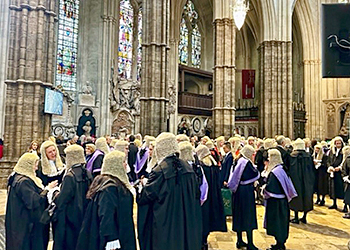
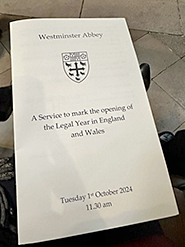
Another memorable event in London was at the historic Temple Church, a site steeped in legal and religious significance. The Temple Church, dating back to the 12th century, served as the spiritual and administrative center for the Knights Templar and later became closely associated with the legal profession, particularly the Inner and Middle Temples, two of the four Inns of Court. The law ceremony for new graduates held at Temple Church was a formal and dignified affair attended by family, friends, mentors, acquaintances and the like. It was a moment of reflection and renewal, reminding legal practitioners of their noble duty to uphold the rule of law and protect the rights of individuals. It was such a beautiful welcome to the legal profession.
The “Battle” of the Inns
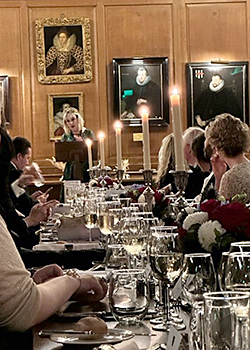 The Inns of Court, with their storied halls and ancient traditions, bear a striking resemblance to the world of Harry Potter. Just as Hogwarts School of Witchcraft and Wizardry is divided into four houses, each with its own unique identity—Gryffindor, Hufflepuff, Ravenclaw, and Slytherin—the Inns of Court are comprised of four venerable institutions: Lincoln's Inn, Gray's Inn, Inner Temple, and Middle Temple. Each Inn has its own distinct character, history, and sense of camaraderie among its members. The sense of belonging and loyalty that one feels towards their Inn is akin to the house pride experienced by students at Hogwarts. New members of the legal profession often feel a strong bond with their chosen Inn, similar to young wizards and witches sorted into houses by the Sorting Hat. The rituals, ceremonies, and shared experiences within the Inns of Court foster a strong sense of community and tradition that echoes the magical bonds formed at Hogwarts.
The Inns of Court, with their storied halls and ancient traditions, bear a striking resemblance to the world of Harry Potter. Just as Hogwarts School of Witchcraft and Wizardry is divided into four houses, each with its own unique identity—Gryffindor, Hufflepuff, Ravenclaw, and Slytherin—the Inns of Court are comprised of four venerable institutions: Lincoln's Inn, Gray's Inn, Inner Temple, and Middle Temple. Each Inn has its own distinct character, history, and sense of camaraderie among its members. The sense of belonging and loyalty that one feels towards their Inn is akin to the house pride experienced by students at Hogwarts. New members of the legal profession often feel a strong bond with their chosen Inn, similar to young wizards and witches sorted into houses by the Sorting Hat. The rituals, ceremonies, and shared experiences within the Inns of Court foster a strong sense of community and tradition that echoes the magical bonds formed at Hogwarts.
If you are not much of a Harry Potter fan, I have another example for you. I found the Inns of Court to be comparable to the Divine Nine, the nine historically Black Greek-letter organizations that make up the National Pan-Hellenic Council. Although I am not part of a sorority, I have come to learn and appreciate from my friends and colleagues the importance of the Divine Nine. Much like the Inns of Court, each of the Divine Nine organizations has its own distinct identity, history, and traditions. These fraternities and sororities foster a strong sense of belonging and pride among their members, akin to the loyalty and camaraderie experienced within the Inns. Initiation into both institutions is marked by rituals, ceremonies, and a sense of community that transcends generations. The Divine Nine, with their emphasis on scholarship, leadership, and service, mirror the Inns' dedication to the pursuit of legal excellence and the mentorship of young barristers. Both the Inns of Court and the Divine Nine serve as pillars of tradition and learning, nurturing their members' personal and professional development while fostering enduring bonds and a shared commitment to their respective fields.
The majestic buildings of the Inns, with their historic halls, serene gardens, and grand libraries create an atmosphere that embodies the pursuit of legal excellence. The formal dinners, moots, and lectures held within these hallowed walls are a testament to the enduring commitment to nurturing the next generation of legal minds. I deeply appreciate the kind invitations from each Inn to attend lectures, lunches and dinners, engage with Inn members and students, and immerse myself in their rich histories.
Chambers…it’s Not Just for Judges
Back home, if I say that “I had to go to chambers,” my colleagues will ask me “oh yeah, for which Judge?” In the UK, however, “chambers” also refers to a group of barristers who share office space and administrative resources. Barristers are specialized advocates who represent clients in court, providing expert legal advice and presenting cases before judges and juries. Unlike American attorneys who often work within law firms or in-house legal departments, barristers in the UK operate as independent practitioners. Each barrister within a set of chambers operates as a sole practitioner but benefits from the pooled resources and collegial environment that chambers provide. You might even find that your colleague in chambers is opposing counsel for one of your cases. Wild, right?!
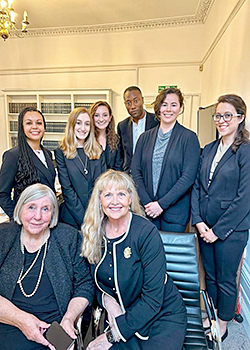 The process of becoming a member of chambers is competitive and involves an application process known as “pupillage,” which is akin to an apprenticeship. During this period, aspiring barristers work under the guidance of experienced practitioners, gaining practical experience and proving their capabilities. Successful completion of pupillage can lead to an offer to join chambers as a “tenant.” The challenge that UK is currently facing is the number available pupillages for new graduates. In the U.S., the concept of a pupillage is not required, and internships tend to be more readily available. This provides our English friends with a unique challenge after graduating from law school that we just do not see in the U.S.
The process of becoming a member of chambers is competitive and involves an application process known as “pupillage,” which is akin to an apprenticeship. During this period, aspiring barristers work under the guidance of experienced practitioners, gaining practical experience and proving their capabilities. Successful completion of pupillage can lead to an offer to join chambers as a “tenant.” The challenge that UK is currently facing is the number available pupillages for new graduates. In the U.S., the concept of a pupillage is not required, and internships tend to be more readily available. This provides our English friends with a unique challenge after graduating from law school that we just do not see in the U.S.
The concept of chambers may appear familiar yet distinct to an American lawyer. While the collegiality and resource-sharing aspects might resemble certain aspects of American law firms, the independence of each barrister and the unique traditions of the Inns of Court set the British system apart. This structure underscores the barrister's role as a specialist advocate, distinct from the solicitor, who generally handles client relationships and preparatory work. Stay tuned for more about barristers and solicitors in a later section.
Jury Selection…That Was Fast!
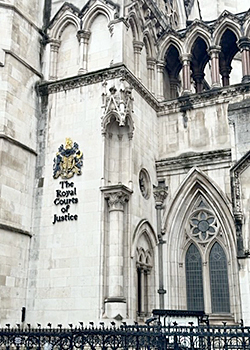 This part of the story, I believe, will resonate with many of my fellow trial attorneys. I was absolutely fascinated by how British lawyers navigate trials, in particular, jury selection. In the UK, the selection of jurors is more streamlined and less adversarial. Potential jurors are randomly selected from the electoral register, ensuring a broad cross-section of the community. Once summoned, jurors undergo a brief vetting process conducted by the court with their eligibility and impartiality assessed based on statutory requirements.
This part of the story, I believe, will resonate with many of my fellow trial attorneys. I was absolutely fascinated by how British lawyers navigate trials, in particular, jury selection. In the UK, the selection of jurors is more streamlined and less adversarial. Potential jurors are randomly selected from the electoral register, ensuring a broad cross-section of the community. Once summoned, jurors undergo a brief vetting process conducted by the court with their eligibility and impartiality assessed based on statutory requirements.
Unlike in the U.S. at the state court level, there is no extensive voir dire process driven by the attorneys. Challenges to jurors are rare and are typically limited to cases of clear bias or conflict of interest. This streamlined process reflects the UK's emphasis on efficiency and the presumption that most citizens can deliver a fair verdict. Like the U.S., the juror's role is strictly confined to determining the facts of the case, with the judge guiding them on matters of law. This delineation ensures that the jurors can focus on evaluating the evidence presented, free from the complexities of legal arguments.
The UK system, with its emphasis on random selection and minimal attorney involvement, seeks to uphold the principles of impartiality and community representation in the administration of justice. To give you some additional perspective, I can say that jury selection lasted about fifteen minutes for a criminal trial I observed. I lost count the number of times I said this was mind blowing during my conversations with my fellow British criminal lawyers. I am very grateful to Jon Metzer, Rory Badenoch, Jo Moore, Lance Baynham, and Ben Seifert of 1 Crown Office Row for letting me observe and welcoming me as part of your team. I am also equally grateful to Dingle Clark and Catherine Milsom of Goldsmith Chambers. Both chambers had me busy and it was a privilege to see these stellar advocates in action!
The Supremes
The UK Supreme Court, established in October 2009, is the highest court in the United Kingdom. It serves as the final court of appeal for civil cases across the UK, and for criminal cases in England, Wales, and Northern Ireland. Housed in the historic Middlesex Guildhall in Parliament Square, London, this Court replaced the Appellate Committee of the House of Lords, signifying a clear separation of the judiciary from the legislature. The Supreme Court consists of twelve Justices, including the President and Deputy President, who are appointed by the Monarch on the advice of the Prime Minister and Lord Chancellor. These justices are selected based on their extensive legal experience and contributions to the judiciary.
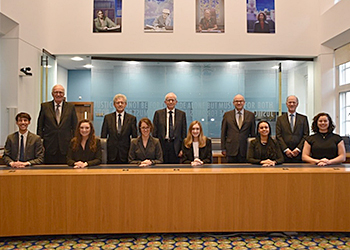 One notable difference from the U.S. Supreme Court is that the UK Supreme Court does not have the power to strike down primary legislation passed by Parliament. Instead, it can issue declarations of incompatibility where legislation conflicts with the European Convention on Human Rights, prompting Parliament to reconsider the provisions. Observing oral arguments in this prestigious court, particularly those concerning incompatibility issues, was an enlightening experience. The opportunity to engage in insightful discussions in chambers with Supreme Court Justices was a rare privilege, offering an unparalleled glimpse into the intricacies of the UK's highest judicial authority. Thank you to Lord Sales and Lady Simler for the academic and practical legal dialogues. I am also grateful to Monty Flynn, Amna Ali, and the rest of the judicial assistants for being so helpful and welcoming. I learned tremendously from our discussions.
One notable difference from the U.S. Supreme Court is that the UK Supreme Court does not have the power to strike down primary legislation passed by Parliament. Instead, it can issue declarations of incompatibility where legislation conflicts with the European Convention on Human Rights, prompting Parliament to reconsider the provisions. Observing oral arguments in this prestigious court, particularly those concerning incompatibility issues, was an enlightening experience. The opportunity to engage in insightful discussions in chambers with Supreme Court Justices was a rare privilege, offering an unparalleled glimpse into the intricacies of the UK's highest judicial authority. Thank you to Lord Sales and Lady Simler for the academic and practical legal dialogues. I am also grateful to Monty Flynn, Amna Ali, and the rest of the judicial assistants for being so helpful and welcoming. I learned tremendously from our discussions.
Two Heads are Better than One
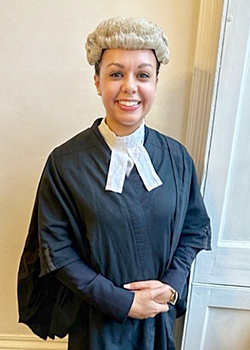 The UK has an interesting dual legal system that is divided into two distinct roles: barristers and solicitors. Barristers are typically seen as courtroom advocates that specialize in litigation. They generally receive their cases through referrals from solicitors and are known for their ability to provide specialized legal advice and advocacy. Solicitors, on the other hand, are generally the first point of contact for clients seeking legal advice. They handle a wide range of legal matters, including transactional work, drafting legal documents, and case management. To ensure clients receive both specialized advocacy and comprehensive legal support, these attorneys must work as a team.
The UK has an interesting dual legal system that is divided into two distinct roles: barristers and solicitors. Barristers are typically seen as courtroom advocates that specialize in litigation. They generally receive their cases through referrals from solicitors and are known for their ability to provide specialized legal advice and advocacy. Solicitors, on the other hand, are generally the first point of contact for clients seeking legal advice. They handle a wide range of legal matters, including transactional work, drafting legal documents, and case management. To ensure clients receive both specialized advocacy and comprehensive legal support, these attorneys must work as a team.
Since this dual legal system has distinct differences, barristers and solicitors each have a professional representative body: the Bar Council for barristers and the Law Society for solicitors. Both professional bodies, akin to the American Bar Association, serves to provide attorneys with support, promote an independent, ethical, and diverse profession, fair access to justice, advocate for the rule of law and influence policy decisions impacting the legal system. I had the opportunity to observe this system in operation and appreciate the professionalism and collaboration demonstrated by these practitioners. Lastly, many barristers, especially those in criminal practice, still wear their robe and wigs.
Tale of Two “Cities”
“It was the best of times, it was the worst of times, it was the age of wisdom, it was the age of foolishness, it was the epoch of belief, it was the epoch of incredulity, it was the season of Light, it was the season of Darkness, it was the spring of hope, it was the winter of despair, we had everything before us, we had nothing before us, we were all going direct to Heaven, we were all going direct the other way—in short, the period was so far like the present period, that some of its noisiest authorities insisted on its being received, for good or for evil, in the superlative degree of comparison only.”—Charles Dickens
The UK and U.S. legal professions are working to improve diversity and inclusion, making progress but still facing challenges. As I reflected on this topic, I was inspired by the juxtaposition found in Charles Dickens' "A Tale of Two Cities" as it aptly mirrors the complex landscape of diversity and inclusion within the legal profession on both sides of the Atlantic. As Dickens explores the dichotomies of wisdom and folly, light and darkness, hope and despair, the legal profession grapples with the contrasting realities of progress and persistent inequality.
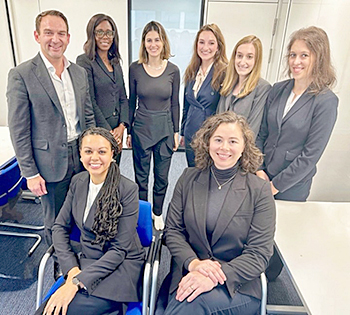 The shift towards a more inclusive profession in each country reflects changing demographics and enriches the diversity of legal perspectives. The progress for a more equitable, diverse, and inclusive legal profession can be attributed to legislative changes, dedicated initiatives to promote diversity and inclusion, and the tireless efforts of pioneers of diverse backgrounds and allies who paved the way for future generations. Mentorship programs and support networks have also played a crucial role in encouraging and retaining diverse talent within the legal profession. While the percentage of lawyers from diverse backgrounds has been on the rise, unconscious bias, disparities, pay gaps, and underrepresentation still exist.
The shift towards a more inclusive profession in each country reflects changing demographics and enriches the diversity of legal perspectives. The progress for a more equitable, diverse, and inclusive legal profession can be attributed to legislative changes, dedicated initiatives to promote diversity and inclusion, and the tireless efforts of pioneers of diverse backgrounds and allies who paved the way for future generations. Mentorship programs and support networks have also played a crucial role in encouraging and retaining diverse talent within the legal profession. While the percentage of lawyers from diverse backgrounds has been on the rise, unconscious bias, disparities, pay gaps, and underrepresentation still exist.
I appreciate Barbara Mills KC President of the Bar Council and Nicholas Emmerson President of the Law Society for their condor about this topic and the efforts they are making, and have made, to diversify the legal workforce. I was also glad to see the initiatives undertaken to acknowledge and celebrate the contributions of women jurists and lawyers to the legal profession. For both of our countries, this is a narrative of progress and setbacks, hope and disillusionment, but ultimately, it is a story of resilience and the ongoing pursuit of justice and equality.
Beyond London
Another significant aspect of this program is the opportunity to travel beyond London. This year, Pegasus scholars visited Edinburgh, Dublin, and The Hague. I was also able to add a bonus trip to Birmingham. Each city had its unique beauty, character, and charm.
Birmingham, England
My visit to Birmingham was a wonderful surprise. While seeking information about the National Black Crown Prosecutors Association (NBCPA), I connected with NBCPA president Nathan Miebai, who invited me to attend the NBCPA’s annual conference in Birmingham this year.
The NBCPA is an organization dedicated to promoting diversity and inclusion within the legal system. It serves as a beacon of support for crown prosecutors of color offering a platform for professional development, mentorship, and networking. The NBCPA also plays a crucial role in addressing issues such as unconscious bias, racial disparities, and barriers to advancement within the legal profession. Through its annual conference, the NBCPA brings together legal professionals to share best practices, discuss challenges, and celebrate achievements in the ongoing pursuit of equality and justice. The NBCPA is also a chapter organization of the National Black Prosecutors Association (NBPA) in the US.
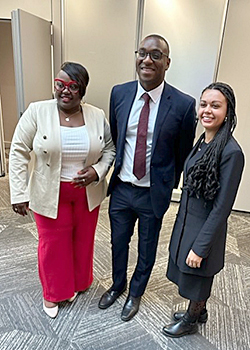 I had the privilege of meeting other prosecutors of color that serve in the Crown Prosecution Service (CPS), learned extensively about victims’ rights initiatives, and gained a more in depth understanding of the CPS. Like prosecutors’ office in the US, the CPS is the principal public agency responsible for prosecuting criminal cases that have been investigated by the police and other investigative organizations. The CPS is organized into regional offices across England and Wales, each led by a Chief Crown Prosecutor. At the conference, there were prosecutors from several regions in attendance. I am very appreciative of Barbara Mills KC and Jason Pittman KC for facilitating the connection with the NBCPA and their time. I am also very grateful to Nathan Miebai and the NBCPA team, Grace Ononiwu CBE Director of Legal Services at CPS, Norvella Pendergrass Secretary of the NBPA and, Nicholas Sensley Founder & CEO at the Institute for American Policing Reform for their kindness, welcoming spirit, and generosity.
I had the privilege of meeting other prosecutors of color that serve in the Crown Prosecution Service (CPS), learned extensively about victims’ rights initiatives, and gained a more in depth understanding of the CPS. Like prosecutors’ office in the US, the CPS is the principal public agency responsible for prosecuting criminal cases that have been investigated by the police and other investigative organizations. The CPS is organized into regional offices across England and Wales, each led by a Chief Crown Prosecutor. At the conference, there were prosecutors from several regions in attendance. I am very appreciative of Barbara Mills KC and Jason Pittman KC for facilitating the connection with the NBCPA and their time. I am also very grateful to Nathan Miebai and the NBCPA team, Grace Ononiwu CBE Director of Legal Services at CPS, Norvella Pendergrass Secretary of the NBPA and, Nicholas Sensley Founder & CEO at the Institute for American Policing Reform for their kindness, welcoming spirit, and generosity.
Edinburgh, Scotland
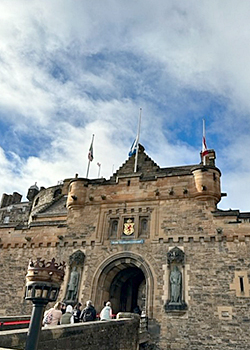 Edinburgh, the capital of Scotland, is renowned for its stunning architecture, rich history, and vibrant cultural scene. Edinburgh Castle, perched high atop Castle Rock, is one of the most iconic and enchanting sites in Scotland. The historical significance of Edinburgh is palpable in its cobbled streets and well-preserved buildings. Since its inauguration in 1532, the Court of Session is Scotland’s highest civil court and located in Edinburgh’s Parliament House. Lady Dorian is the first woman to be appointed to the position of Lord Justice Clerk, which is the second most senior judge in Scotland. We had the privilege of having tea with Lady Dorian and her kindly serving as our guide of Parliament Hall that we learned was used by the courts after Parliament moved to London.
Edinburgh, the capital of Scotland, is renowned for its stunning architecture, rich history, and vibrant cultural scene. Edinburgh Castle, perched high atop Castle Rock, is one of the most iconic and enchanting sites in Scotland. The historical significance of Edinburgh is palpable in its cobbled streets and well-preserved buildings. Since its inauguration in 1532, the Court of Session is Scotland’s highest civil court and located in Edinburgh’s Parliament House. Lady Dorian is the first woman to be appointed to the position of Lord Justice Clerk, which is the second most senior judge in Scotland. We had the privilege of having tea with Lady Dorian and her kindly serving as our guide of Parliament Hall that we learned was used by the courts after Parliament moved to London.
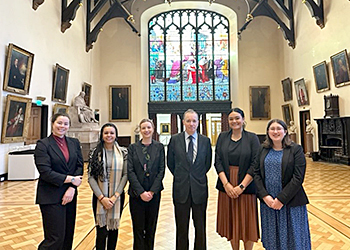 One of the portraits in the Hall is of Henry Dundas, 1st Viscount Melville. He represented Joseph Knight, an African man enslaved in Jamaica and brought to Scotland. Knight sought his freedom, arguing that slavery was not recognized under Scots law. Dundas’s advocacy was instrumental in the landmark 1778 ruling by the Court of Session, which declared that slavery was not supported by Scottish law, leading to Knight's emancipation. Knight was the first freed slave in Scotland. This case set a significant precedent, contributing to the abolitionist movement in Scotland.
One of the portraits in the Hall is of Henry Dundas, 1st Viscount Melville. He represented Joseph Knight, an African man enslaved in Jamaica and brought to Scotland. Knight sought his freedom, arguing that slavery was not recognized under Scots law. Dundas’s advocacy was instrumental in the landmark 1778 ruling by the Court of Session, which declared that slavery was not supported by Scottish law, leading to Knight's emancipation. Knight was the first freed slave in Scotland. This case set a significant precedent, contributing to the abolitionist movement in Scotland.
Dublin, Ireland
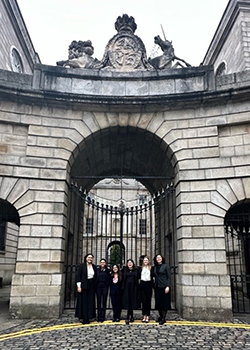 Our next destination was Dublin, Ireland, a dynamic city that exudes a unique blend of old-world charm and modern sophistication. The Criminal Courts of Justice is a modern judicial complex housing the Central Criminal Court, the Special Criminal Court, and the Court of Appeal. Opened in 2010, the building’s architecture draws inspiration from the Pantheon, featuring a grand hall that welcomed us with its notable design and spaciousness. During our visit, I was particularly impressed by the Victims Suite, which provides a safe and supportive environment for victims and witnesses. This suite is equipped with private consultation rooms, comfortable waiting areas, and video-link facilities, ensuring that those who have experienced trauma can participate in the judicial process with dignity, respect, and confidence. This kind of design by a court reflects a commitment to justice that is both compassionate and comprehensive.
Our next destination was Dublin, Ireland, a dynamic city that exudes a unique blend of old-world charm and modern sophistication. The Criminal Courts of Justice is a modern judicial complex housing the Central Criminal Court, the Special Criminal Court, and the Court of Appeal. Opened in 2010, the building’s architecture draws inspiration from the Pantheon, featuring a grand hall that welcomed us with its notable design and spaciousness. During our visit, I was particularly impressed by the Victims Suite, which provides a safe and supportive environment for victims and witnesses. This suite is equipped with private consultation rooms, comfortable waiting areas, and video-link facilities, ensuring that those who have experienced trauma can participate in the judicial process with dignity, respect, and confidence. This kind of design by a court reflects a commitment to justice that is both compassionate and comprehensive.
Dublin is also known for its historic institutions. Established in 1541, the King's Inns is Ireland's oldest school of law and the professional body for barristers. As we walked through the halls, we were immersed in the rich history of the Irish legal system, with portraits of eminent jurists and legal luminaries adorning the walls. The King's Inns is not only a place of learning but also a symbol of justice and legal excellence in Ireland. It plays a vital role in shaping the next generation of legal professionals, offering rigorous training and admitting those who wish to be awarded the degree of Barrister-at-Law required to be called to the Bar in Ireland. Dining at an Inn in Ireland and the UK is a highly regarded tradition that has been, and continues to be, centered on fostering a spirit of collegiality. I was honored to also experience this tradition at the King’s Inn.
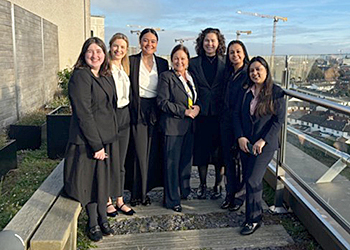 I thank Judge Power for organizing our agenda in Ireland. I also appreciate her and that of her judicial assistant, Jennifer Price, for their time, insightful conversations, kindness, and gracious hosting. Judge Ann Powers serves on the Court of Appeal since 2019. Prior to her appointment she served as a presiding judge for the Kosovo Specialist Chambers and judge for European Court of Human Rights.
I thank Judge Power for organizing our agenda in Ireland. I also appreciate her and that of her judicial assistant, Jennifer Price, for their time, insightful conversations, kindness, and gracious hosting. Judge Ann Powers serves on the Court of Appeal since 2019. Prior to her appointment she served as a presiding judge for the Kosovo Specialist Chambers and judge for European Court of Human Rights.
Den Haag, the Netherlands
The Hague in the Netherlands is an illustrious city known for its pivotal role in international diplomacy and justice. Strolling through The Hague, I was struck by the confluence of rich cultural heritage and contemporary urban life. The city's museums and art galleries contribute to a vibrant cultural scene, while the picturesque canals and lush parks offer serene escapes within the bustling metropolis. It was lovely to see “The Girl with the Pearl Earring” at the Mauritshuis. The city's international character is reflected in its diverse population, with expatriates and diplomats from around the globe calling The Hague home. The Hague's commitment to peace and justice is epitomized by its role as the host city of the International Criminal Court (ICC) and the Kosovo Specialist Chambers (KSC).
The ICC is an intergovernmental organization and international tribunal, independent of the United Nations, that has jurisdiction to prosecute individuals for the international crimes of genocide, crimes against humanity, war crimes, and crimes of aggression. The Court is composed of four organs: the Presidency, the Judicial Divisions, the Office of the Prosecutor, and the Registry. During our visit, we were able to tour the ICC and observe an ongoing trial of a man charged with war crimes and crimes against humanity allegedly committed in Bangui (CAR) in 2013. In December 2021, the ICC confirmed the charges, and trial began in September 2022 and is still ongoing. To supplement our trial observations, we had a fruitful discussion with Kamran Choudhry who serves as a prosecuting trial lawyer with the Office of the Prosecutor at the ICC and assigned to the case we observed.
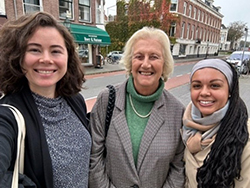 Our visit to the ICC would not have been possible without the support and assistance of Her Excellency Judge Joanna Korner CMG, KC. I am appreciative of her time and willingness to meet with us. We had a great lunch. Judge Korner is an English-based ICC judge with more than 45 years of criminal law experience as a judge and barrister and is known for her significant contributions on and off the bench.
Our visit to the ICC would not have been possible without the support and assistance of Her Excellency Judge Joanna Korner CMG, KC. I am appreciative of her time and willingness to meet with us. We had a great lunch. Judge Korner is an English-based ICC judge with more than 45 years of criminal law experience as a judge and barrister and is known for her significant contributions on and off the bench.
The KSC is a judicial institution established to investigate and prosecute crimes committed during and after the Kosovo conflict from 1998 to 2000. The KSC functions independently within the Kosovo legal system but operates under Dutch law for practical reasons. This court was created following allegations of serious human rights violations, including war crimes and crimes against humanity. The KSC is composed of both international and Kosovo judges, ensuring an impartial and balanced approach to justice. Kimberly West is former US federal prosecutor and was selected to serve as Specialist Prosecutor after a process organized by the European Union. We had the opportunity to observe an ongoing trial and meet with Ms. West. I found her insights enlightening and appreciated her time during our visit. Our visit to the KSC was a first for Pegasus scholars. We hope that we can continue to foster our relationships in The Hague for future scholars.
Many Thanks
One of the remarkable gifts I gained in becoming a Pegasus scholar are the connections I made along the way. Sharing experiences allows us to form a bond and grants us the opportunity to find common ground despite our differences. When we accept this opportunity, share in fellowship, and immerse ourselves in each other’s culture, we learn resilience. A trait that, I believe, is needed for every great advocate. I am appreciative of my fellow Pegasus and Temple Bar scholars for enlightening my experience. I am very grateful to all my UK hosts for all their efforts to make this such an enriching experience, and to the American Inns of Court for sponsoring such an incredible program.
A special thank you to John Burke, Caroline Merck, Jamil Mohammed, Jon Metzer, Peter Melleney, Sarah Clark KC, Libby Bingham, Judge Barbara Lynn, and Judge Consuelo Callahan for your kindness, willingness to be of service, check-ins, and words of wisdom. Also, special thanks to Lord Reed of the UK Supreme Court for a delightful welcome of the scholars to the Court, and to Ayo Onatade for her patience and excellent administrative skills in supporting us. Equally, I am grateful to the team at Inner Temple for your continued support and dedication to the Pegasus Scholarship.
I would be remiss if I did not express my deep gratitude to Judge Rachelle Carnesale and Judge Ana Maria Martinez for their recommendations and their continued support, to my family and friends for their unwavering faith in me, as well as to the Fulton County District Attorney’s Office for trusting me to take the time to participate in this program. I am also deeply grateful to the Judge Clarence Cooper Inn of Court for their support. This absolutely was a once-in-a-lifetime experience that has made me a better person and advocate.
Lastly, but certainly not least, an infinite thanks to Cindy Dennis for her dedication and support of the Pegasus Scholarship and its scholars. Cindy—you are exceptional!
 Stacey Burke is a senior assistant district attorney for the Fulton County District Attorney’s Office in Atlanta, Georgia, where she prosecutes or resolves by plea felony criminal cases. Before that, she was a criminal defense attorney at a boutique law firm Rohan Law PC in Atlanta and senior attorney focused on insurance and financial services consumer complaints for Primerica Inc. Earlier in her career, she served as an advocate for immigrant victims of violent crime at the Hispanic Interest Coalition of Alabama. She earned her law degree at John Marshall Law School in Atlanta in 2017 and served as South-Atlantic regional director of the National Latino/a Law Student Association. During law school, she had several internships, including a stint as a legal intern for the Office of the Attorney General for the Republic of Palau and for the Office of the Special Prosecutor for the Republic of Palau. She earned an undergraduate degree in political science and modern languages from Eckerd College in St. Petersburg, Florida, in 2010. During college, she participated in study abroad programs in Switzerland, Mexico, Dominican Republic, and Italy. A member of the Judge Clarence Cooper American Inn of Court in Atlanta, she participated in the National Trial Advocacy Program in 2023.
Stacey Burke is a senior assistant district attorney for the Fulton County District Attorney’s Office in Atlanta, Georgia, where she prosecutes or resolves by plea felony criminal cases. Before that, she was a criminal defense attorney at a boutique law firm Rohan Law PC in Atlanta and senior attorney focused on insurance and financial services consumer complaints for Primerica Inc. Earlier in her career, she served as an advocate for immigrant victims of violent crime at the Hispanic Interest Coalition of Alabama. She earned her law degree at John Marshall Law School in Atlanta in 2017 and served as South-Atlantic regional director of the National Latino/a Law Student Association. During law school, she had several internships, including a stint as a legal intern for the Office of the Attorney General for the Republic of Palau and for the Office of the Special Prosecutor for the Republic of Palau. She earned an undergraduate degree in political science and modern languages from Eckerd College in St. Petersburg, Florida, in 2010. During college, she participated in study abroad programs in Switzerland, Mexico, Dominican Republic, and Italy. A member of the Judge Clarence Cooper American Inn of Court in Atlanta, she participated in the National Trial Advocacy Program in 2023.